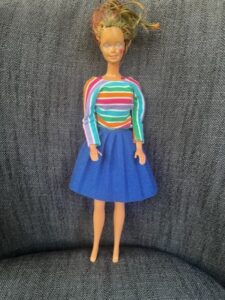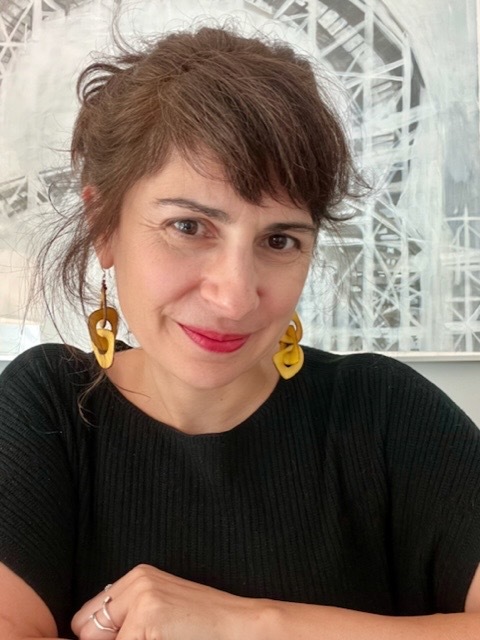By Cara Maniaci, MA, LCSW
I too had a Weird Barbie. When I was about 11 or 12, my best friend Sarah and I gathered our Barbies, some hairspray and glue, nail polish remover and marker. We mismatched and cut up the Barbies’ clothes. We removed some of their printed-on makeup and redrew it by hand. We thought of it as giving dolls punk rock makeovers, even taking “Before” and “After” pictures like we saw in Seventeen magazine.
For those who have not seen Greta Gerwig’s blockbuster Barbie movie, by Weird Barbie, I’m referring specifically to a character played by Kate McKinnon. Unlike the other perfect Barbies in Barbieland, everything about Weird Barbie is askew, her hair has been chopped, her face drawn over with marker, and she’s always in “the splits,” On the Hero’s Quest of the movie’s narrative, Weird Barbie is her mentor — her Virgil, her Glinda the Good Witch —whose task is to explain to Stereotypical Barbie—our reluctant Hero —why she must enter the Real World to understand some of the strange things that have been happening to her.
In her recent New Yorker piece “Why Barbie Must be Punished,” (online edition July 29, 2023) Leslie Jamison reflects on the Barbie movie to come to terms with her own ambivalent relationship with Barbie as a girl, and again as a mother of a daughter, reckoning with the paradoxes of a doll who seems to have it all in a world designed to keep women under glass ceilings. She points to the love-hate relationship with Barbie as part of the design, and extrapolates from Winnicott, positing the term “post-transitional object” to describe what Barbie is for many girls: “not a surrogate mother so much as an anti-mother; a version of the self that does not need to mother or be mothered; a proto-teen-age self that can push the mother away more forcibly.” This all occurring at the time when preteens are not just reckoning with their own femininity in an imperfect, misogynist world, but also their mothers’ fragility as women, as mothers. They are realizing their mothers, like Stereotypical Barbie in the movie — do not have it all figured out.
But in the Real world the pushing is not as often taken out on dolls — more often done to one’s own body. At the benign end, through the piercings and tattoos that color adolescence — at the insidious end, through the self-harm and eating disorders. So much of the pain and confusion of adolescence is unspeakable — there are more words for it now thanks to the increased sophistication and awareness of mental illness in teens. In the movie, words are the silver bullet— the Barbies are woke by speaking the truth in the paradoxes of their existence in a patriarchal world. One after the other describes the suffocating contradictions that frame ideal femininity and the spell of patriarchy is broken.
Winnicott knew where we don’t have words, we have play. No need for a concept such as post-transitional object — Winnicott’s transitional objects do get destroyed, lost, and recovered, like Freud’s grandson’s cotton reel. And in play they transform into something new, something that gets internalized in a form that can contain the complexity of it all — the possession of self, the experience of pain, the raging at mom while loving her to pieces, the wonder of having a body, of self-expression, of power. In a good psychoanalysis, the analyst becomes that object — idealized and denigrated, poked and prodded— reckoned with. In a good analysis, it’s not just what’s said but how it’s expressed and then engaged that is transformative, even creative.
I’ve saved my Weird Barbie all these years in a Bass shoebox that once contained the penny loafers I liked to wear—without socks—at the time. I still have her, and the Polaroids Sarah and I took. I’m far from a hoarder and I have wondered why I could never seem to toss her out after 36 years. Why hold onto something that seemed to represent violence and destruction to the feminine? But no — I didn’t destroy something, I created something. Something I needed at the time—on the cusp of careening into adolescence with deep reservations about gender norms but none of the words I have now to express that. And, I suppose after all these years I’ve still needed her around — to remind me of myself when I don’t have the words.

Cara Maniaci is a candidate in the Advanced Analytic Training Program at WCSPP. She is a graduate of the Stephen Mitchell Center for Relational Studies and the Couples Therapy Training Program at WCSPP. Cara has a private practice in Pleasantville, NY.


